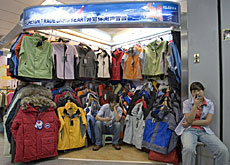Poorer nations lack support to sink piracy

The international community must do more to help poorer countries protect intellectual property rights and tackle counterfeiting, according to a Swiss official.
Nikolaus Thumm, senior economic counsellor at the Federal Institute of Intellectual Property, says most countries have legislation to combat piracy but enforcement is far from satisfactory.
“It’s nice to have good-looking laws and regulations, but if they are not enforced they are not worth anything,” he told swissinfo.
Thumm was speaking at the end of a two-day international conference in Geneva to discuss protection and rights enforcement in transition countries within the United Nations Economic Commission for Europe (UNECE) region.
According to a recent Organisation for Economic Cooperation and Development report, international trade in counterfeit and pirated products could have been up to $200 billion (SFr242 billion) in 2005.
Swiss watchmakers estimate that the trade in fake watches costs the industry around SFr800 million a year.
The Swiss government wants to see progress in two main areas: capacity-building projects on the ground, such as training judges and customs officers, and more involvement from the private sector.
Switzerland plans to set up an enforcement project with Azerbaijan, one of the transition countries in the UNECE region, with the aim of sharing know-how on IP protection and enforcement.
Another challenge is changing the mindset in countries where counterfeiting and piracy have been endemic for decades.
The UN stresses that failure to take action will slow economic development, restrict investment in research and development, and lead to health and safety risks from unsafe counterfeit goods.
Strict protection
Thumm admits that industrialised nations, such as Switzerland, have a “selfish interest” in ensuring strict IP protection abroad but he says the system works both ways.
“The argument that comes from many governments is that the counterfeiting industry is of economic importance, but this argument is not sustainable because countries at low economic levels need investment and trade – and that goes hand in hand with IP protection,” he said.
“No Swiss company is going to invest in a country where there is a very weak level of IP protection and enforcement, especially when it comes to technical products where you run a high risk that people will just run away with your inventions and reproduce them themselves.”
In January this year Justice Minister Christoph Blocher announced a tougher line against counterfeiting, which costs the Swiss economy an estimated SFr2 billion a year.
A Stop Piracy billboard campaign was launched to raise public awareness of the potential risks of buying counterfeit goods.
Blocher also announced planned amendments to the law on patents, which would allow the customs authorities to increase checks on transiting goods and confiscate illegal products.
Switzerland is ranked second after China as an origin of counterfeit goods entering the EU. The authorities stress that there is hardly any production of pirated and counterfeit goods in Switzerland but say the country is used as a transit point.
swissinfo, Adam Beaumont in Geneva
An example of recent cooperation is the agreement signed between Switzerland and Vietnam earlier this month.
After drawing up legislation that is compatible with the World Trade Organization, the Swiss will support the Vietnamese in applying it effectively. There will also be help in developing intellectual property law in universities.
Aid from the State Secretariat for Economic Affairs for the programme, which stretches over three years, is budgeted at SFr1.2 million. The Federal Institute of Intellectual Property and the Vietnamese authorities are to continue cooperation on the issue.
Nikolaus Thumm is a former chairman of the United Nations Advisory Group on the Protection and Implementation of Intellectual Property Rights for Investment.
Its work has now been taken over by a new UN Team of Specialists on Intellectual Property.

In compliance with the JTI standards
More: SWI swissinfo.ch certified by the Journalism Trust Initiative











You can find an overview of ongoing debates with our journalists here . Please join us!
If you want to start a conversation about a topic raised in this article or want to report factual errors, email us at english@swissinfo.ch.